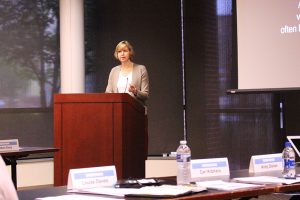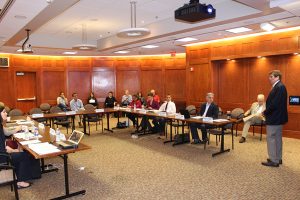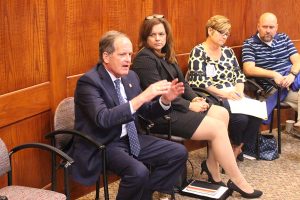


University of North Carolina Lineberger Comprehensive Cancer Center leaders brought together a team of doctors, epidemiologists and environmental scientists on May 13 to discuss patterns and causes of thyroid cancer in North Carolina – a meeting convened in response to community concerns about thyroid cancer trends in Iredell County.
Experts from the National Cancer Institute, the N.C. Department of Health and Human Services, Duke University, UNC Lineberger and other agencies and institutions shared existing thyroid cancer research for the state and nation at the meeting, which was sponsored by UNC Lineberger, the North Carolina Policy Collaboratory, and the UNC Center for Environmental Health and Susceptibility. North Carolina Sen. Vickie Sawyer and Rep. John Fraley, who represent Iredell County, were among those attending the meeting.
The group expects to have by July 1 a report for stakeholders with their recommendations for additional research that is needed to understand the patterns and potential causes of thyroid cancer in the state.
“We’re here today to talk about a problem that has arisen from the voice of the community, where community members are worried that there is an increased number of thyroid cancer cases diagnosed in their defined geographic area,” said UNC Lineberger Director H. Shelton Earp, MD, Lineberger Professor of Cancer Research. “We anticipate that the expert panel can address the epidemiology, clinical detection, and potential environmental causes of the various forms of thyroid cancer.” he added.
UNC Lineberger’s Andrew F. Olshan, PhD, professor in the UNC Gillings School of Global Public Health Department of Epidemiology and associate director for population sciences at UNC Lineberger, convened the panel of experts. He said the group’s goal is to have a set of recommendations for what it would take to investigate the cancer patterns in the state, and parse through the possible multiple competing explanations for these patterns in rates.
Olshan has been involved in studies of cancer incidence and mortality in the state through UNC Lineberger’s community outreach and engagement office and the Cancer Information & Population Health Resource (CIPHR), a robust data resource that researchers can use to investigate cancer occurrence and outcomes in North Carolina.
The meeting included presentations on thyroid cancer data trends in North Carolina, data from studies into potential environmental cancer-linked agents in water, air, and soil in Iredell County, and possible differences in thyroid cancer detection methods around the state.
“We’re trying to coalesce expertise to really say for the county and the state, what are the next logical, well-considered steps? What would constitute a cost-effective research strategy? And can we leverage existing data?” Olshan said.
